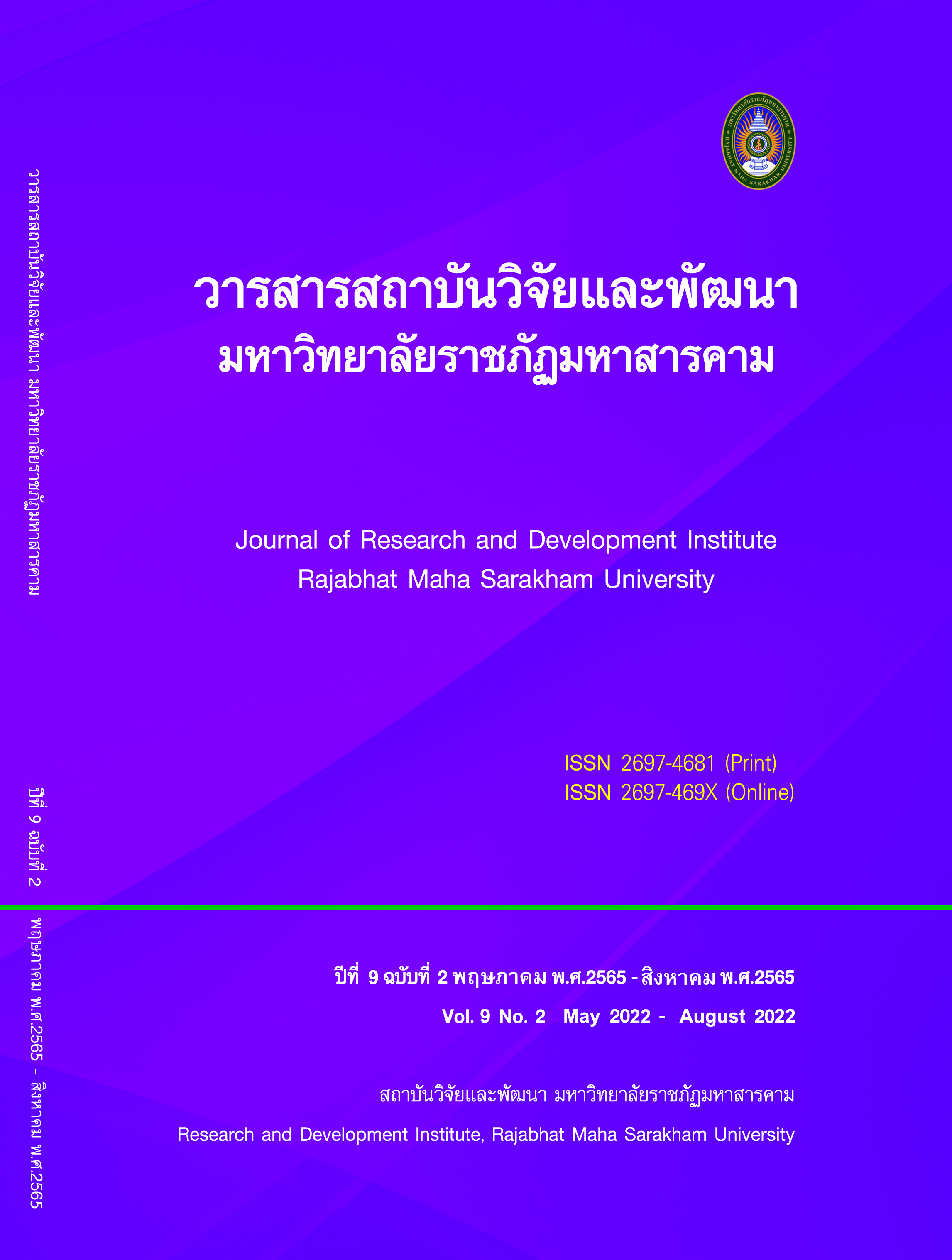Factors Affecting Competency Development of Bachelor of Public Administration Program Students of Rajabhat Maha Sarakham University in the 21st century
Keywords:
Competency, Students, Public AdministrationAbstract
The objectives of this research were 1) to study the level of competency of students in the Bachelor of Public Administration Program of Rajabhat Maha Sarakham University and 2) to study the factors affecting the competency development of students in the Bachelor of Public Administration Program of Rajabhat Maha Sarakham University to be synthesized as a guideline to develop the competence of students in the Bachelor of Public Administration Program of Rajabhat Maha Sarakham University. This research used a quantitative research methodology. Collecting data used questionnaires. The sample group was 120 second and third-year students.
The results showed that the student's overall level of competency was at a high level. The aspect with the highest level of competence was moral and ethics (mean at 4.27 level and S.D. at 0.51 level). The lowest average competence was English language skills (mean at 3.22 level and S.D. at 0.72 level). Considering the factors influencing the competency development of students in the Bachelor of Public Administration Program, students' achievement motivation, achievement-oriented teaching process, and the average monthly income of those responsible for tuition have a multiplicity relationship with the development of student competence statistically significant at the 0.01 level with a multiple correlation coefficient (R) of 0.79. It can predict the development of student competence of Bachelor of Public Administration Program, Department of Public Administration (R2) or able to explain the truth 62.40 percent with a standard error in forecasting equal to +- .297.
References
Bellanca, J. & Brandt, R. (2010). 21st Century Skills: Rethinking How Students Learn. Bloomington: Solition Tree Press.
Bloom, Benjamin S. (1976). Human Characteristics and School Learning. New York : McGraw-Hill.
Kampiranon, S., et al. (2017). Developing a model for promoting learning and teaching and learning management in the Public Administration Curriculum that aims to respond to 21st century learning skills: a case study of specific courses in Public Administration Curriculum Faculty of Humanities and Social Sciences , 11th National Academic Conference “Humanities and Social Sciences in Thailand 4.0. Chonburi : Burapha University.
Kay, K. (2010). 21st Century Skills: Why the Matter, What They are, and How We Get There. In Bellanca, J. & Brandt, R. (Eds.), 21st Century Skills: Rethinking How Students Learn. Bloomington, In: Solution Tree Press.
Kuha, A. & Yongyuan, B. (2004). Factors Affecting Learning Achievement Under Observation of Prince of Songkla University Students Pattani Campus. Pattani : Prince of Songkla University Pattani Campus.
Office of the Higher Education Commission. (2009). Training course for students to promote and support educational quality assurance within higher education institutions. Bangkok : Parbpim Printing.
Panich, V. (2012). Enjoy learning in the 21st century. Bangkok : Sodsri-Saritwong Foundation.
Rotjanalert, N. (2018). A Study on Learning Competencies of Education Students in Silpakorn University. Silpakorn Educational Research Journal, 10(1),11-27.
Sangraksa, N. (2013). “Quality of Education and Learning Skills in the 21st Century: Missions to Review?” in a commemorative book on the occasion of the 10th anniversary “A Decade of Developing Silpakorn Students. Nakhon Pathom : Silpakorn University.
Seenon, M. (2015). An Analysis of Thai 21st Century Education Administration with the System Theory of Education Administration. Innovative Newsletter Institute for Innovative Learning, 10, 40 (October - December): 3-5.
Thanormchayathawat, B., et al. (2016). 21st Century Skills: A Challenge for Student Development. The Southern College Network Journal of Nursing and Public Health, 3(2), 208-222.
Weelasin, W. & Inbueng, L. (2020). Guidelines for developing the identity of graduates in Public Administration Northeastern University Khon Kaen Province. Journal of Modern Learning Development, 5(1), 108-124.
Downloads
Published
How to Cite
Issue
Section
License
Copyright (c) 2022 Journal of Research and Development Institute Rajabhat Maha Sarakham University

This work is licensed under a Creative Commons Attribution-NonCommercial-NoDerivatives 4.0 International License.
Articles that are published are copyrighted by the authors of the articles







